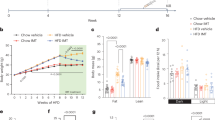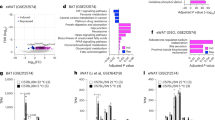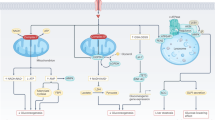Abstract
OBJECTIVE: An unexplained phenotype of mice overexpressing human UCP3 is their improved glucose homeostasis. Since overexpression of UCP3 might affect the energy charge of the cell, we investigated whether these mice have an increased AMP-activated protein kinase (AMPK) activity.
METHODS: Mitochondrial localisation of UCP3 was determined by immunoelectronmicroscopy and AMPK activity was measured in medial gastrocnemius of control mice and mice overexpressing human UCP3.
RESULTS: Mice overexpressing human UCP3 had 5.8 fold higher levels of UCP3 protein, for which mitochondrial localisation was confirmed by immunoelectronmicroscopy. The ATP/AMP ratio was significantly lower in mice over-expressing UCP3 compared to the wild-type (10.9±1.6 vs 20.4±1.9 AU, P=0.03). Over-expression of UCP3 resulted in increased AMPK α1 activity (1.23±0.05 vs 1.00±0.06 normalized values, P=0.004) and a tendency towards increased AMPK α2 activity (1.18±0.08 vs 1.00±0.10 normalized values, P=0.08).
CONCLUSION: Increased AMPK activity provides a plausible explanation for the improved glucose tolerance characteristic for these mice.
This is a preview of subscription content, access via your institution
Access options
Subscribe to this journal
Receive 12 print issues and online access
$259.00 per year
only $21.58 per issue
Buy this article
- Purchase on Springer Link
- Instant access to full article PDF
Prices may be subject to local taxes which are calculated during checkout



Similar content being viewed by others
References
Lin B, Coughlin S, Pilch PF . Bidirectional regulation of uncoupling protein-3 and GLUT-4 mRNA in skeletal muscle by cold. Am J Physiol Endocrinol Metab 1998; 275: E386–E391.
Tsuboyama-Kasaoka N, Tsunoda N, Maruyama K, Takahashi M, Kim H, Ikemoto S, Ezaki O . Up-regulation of uncoupling protein 3 (UCP3) mRNA by exercise training and down-regulation of UCP3 by denervation in skeletal muscles. Biochem Biophys Res Commun 1998; 247: 498–503.
Schrauwen P, Hesselink MK, Blaak EE, Borghouts LB, Schaart G, Saris WH, Keizer HA . Uncoupling protein 3 content is decreased in skeletal muscle of patients with type 2 diabetes. Diabetes 2001; 50: 2870–2873.
Li B, Nolte LA, Ju JS, Ho Han D, Coleman T, Holloszy JO, Semenkovich CF . Skeletal muscle respiratory uncoupling prevents diet-induced obesity and insulin resistance in mice. Nat Med 2000; 6: 1115–1120.
Clapham JC, Arch JR, Chapman H, Haynes A, Lister C, Moore GB, Piercy V, Carter SA, Lehner I, Smith SA . Mice overexpressing human uncoupling protein-3 in skeletal muscle are hyperphagic and lean. Nature 2000; 406: 415–418.
Echtay KS, Roussel D, St Pierre J, Jekabsons MB, Cadenas S, Stuart JA, Harper JA, Roebuck SJ, Morrison A, Pickering S . Superoxide activates mitochondrial uncoupling proteins. Nature 2002; 415: 96–99.
Himms-Hagen J, Harper ME . Physiological role of UCP3 may be export of fatty acids from mitochondria when fatty acid oxidation predominates: an hypothesis. Exp Biol Med (Maywood) 2001; 226: 78–84.
Goglia F, Skulachev VP . A function for novel uncoupling proteins: antioxidant defense of mitochondrial matrix by translocating fatty acid peroxides from the inner to the outer membrane leaflet. FASEB J 2003; 17: 1585–1591.
Schrauwen P, Hoeks J, Schaart G, Kornips E, Binas B, Van De Vusse GJ, Van Bilsen M, Luiken JJ, Coort SL, Glatz JF . Uncoupling protein 3 as a mitochondrial fatty acid anion exporter. FASEB J 2003; 17: 2272–2274.
Hesselink MKC, Greenhaff PL, Constantin-Teodosiu D, Hultman E, Saris WHM, Nieuwlaat R, Schaart G, Kornips E, Schrauwen P . Increased uncoupling protein 3 content does not affect mitochondrial function in human skeletal muscle in vivo. J Clin Invest 2003; 111: 479–486.
Gong D-W, He Y, Karas M, Reitman M . Uncoupling protein-3 is a mediator of thermogenesis regulated by thyroid hormone, β3-adrenergic agonists, and leptin. J Biol Chem 1997; 272: 24129–24132.
Winder WW, Hardie DG . AMP-activated protein kinase, a metabolic master switch: possible roles in type II diabetes. Am J Physiol Endocrinol Metab 1999; 277: E1–10.
Bashan N, Burdett E, Guma A, Sargeant R, Tumiati L, Liu Z, Klip A . Mechanisms of adaptation of glucose transporters to changes in the oxidative chain of muscle and fat cells. Am J Physiol 1993; 264: C430–C440.
Martinez-Menarguez JA, Prekeris R, Oorschot VM, Scheller R, Slot JW, Geuze HJ, Klumperman J . Peri-Golgi vesicles contain retrograde but not anterograde proteins consistent with the cisternal progression model of intra-Golgi transport. J Cell Biol 2001; 155: 1213–1224.
Hardie DG, Salt IP, Davies SP . Analysis of the role of the AMP-activated protein kinase in the response to cellular stress. Methods Mol Biol 2000; 99: 63–74.
Merrill GF, Kurth EJ, Hardie DG, Winder WW . AICA riboside increases AMP-activated protein kinase, fatty acid oxidation, and glucose uptake in rat muscle. Am J Physiol 1997; 273: E1107–E1112.
Bergeron R, Russell III RR, Young LH, Ren JM, Marcucci M, Lee A, Shulman GI . Effect of AMPK activation on muscle glucose metabolism in conscious rats. Am J Physiol 1999; 276: E938–E944.
Buhl ES, Jessen N, Schmitz O, Pedersen SB, Pedersen O, Holman GD, Lund S . Chronic treatment with 5-aminoimidazole-4-carboxamide-1-beta-D-ribofuranoside increases insulin-stimulated glucose uptake and GLUT4 translocation in rat skeletal muscles in a fiber type-specific manner. Diabetes 2001; 50: 12–17.
Fisher JS, Gao J, Han DH, Holloszy JO, Nolte LA . Activation of AMP kinase enhances sensitivity of muscle glucose transport to insulin. Am J Physiol Endocrinol Metab 2002; 282: E18–E23.
Viollet B, Andreelli F, Jorgensen SB, Perrin C, Geloen A, Flamez D, Mu J, Lenzner C, Baud O, Bennoun M . The AMP-activated protein kinase alpha2 catalytic subunit controls whole-body insulin sensitivity. J Clin Invest 2003; 111: 91–98.
Vidal-Puig AJ, Grujic D, Zhang CY, Hagen T, Boss O, Ido Y, Szczepanik A, Wade J, Mootha V, Cortright R . Energy metabolism in uncoupling protein 3 gene knockout mice. J Biol Chem 2000; 275: 16258–16266.
Acknowledgements
The research of Dr P Schrauwen has been made possible by a fellowship of the Royal Netherlands Academy of Arts and Sciences. Dr DG Hardie was supported by a Programme Grant from the Wellcome Trust and a Project Grant from Diabetes UK. We thank Lawrence J Slieker from Eli Lilly and Company for providing us with the UCP3 antibody. The skilful technical assistance of Hans Duimel in preparing and staining the samples for immunogold EM is gratefully acknowledged. This work was supported by a grant from the Human Nutrition Institute of the International Life Sciences Institute Research Foundation (ILSI RF). The opinions expressed herein are those of the author(s) and do no necessarily represent the views of ILSI RF.
Author information
Authors and Affiliations
Corresponding author
Rights and permissions
About this article
Cite this article
Schrauwen, P., Hardie, D., Roorda, B. et al. Improved glucose homeostasis in mice overexpressing human UCP3: a role for AMP-kinase?. Int J Obes 28, 824–828 (2004). https://doi.org/10.1038/sj.ijo.0802629
Received:
Revised:
Accepted:
Published:
Issue Date:
DOI: https://doi.org/10.1038/sj.ijo.0802629
Keywords
This article is cited by
-
An AMP Kinase-pathway dependent integrated stress response regulates ageing and longevity
Biogerontology (2023)
-
Effects of resveratrol and its derivative pterostilbene on brown adipose tissue thermogenic activation and on white adipose tissue browning process
Journal of Physiology and Biochemistry (2020)
-
Differences in the skeletal muscle transcriptome profile associated with extreme values of fatty acids content
BMC Genomics (2016)
-
AMPK: a key regulator of energy balance in the single cell and the whole organism
International Journal of Obesity (2008)



